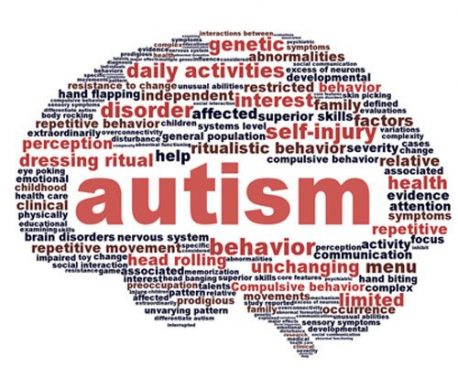Autism (autistic spectrum condition) is a developmental condition where the child has trouble communicating and understanding what people think and feel. This makes it difficult for autistic children to respond to gestures, facial expressions, touch and even language. In addition, such children may also have speech delay and have behavioral difficulties.

Types of Autism
- Autistic Spectrum Disorder (also called “classic” autism)
This is what most people think of when hearing the word “autism.” People with autistic disorder usually have significant language delays, social and communication challenges, and unusual behaviors and interests. Some children with autistic disorder also have intellectual difficulties (difficulties in learning). - Asperger Syndrome
Children with Asperger syndrome usually have some milder symptoms. They might have social challenges and unusual behaviors and interests. However, they typically do not have problems with language or intellectual disability. - Pervasive Developmental Disorder – Not Otherwise Specified (also called “atypical autism”)
People who meet some of the criteria for autistic disorder, but not all, may be diagnosed with atypical autism. People with atypical autism usually have fewer and milder symptoms than those with autistic disorder. The symptoms might cause only social and communication challenges.
Cause(s) of Autism
Despite medical advances, we do not fully know what causes autism.
- It is likely that both genetics and environment play a role. Researchers have identified a number of genes associated with the disorder.
- Studies of people with autism have found irregularities in several regions of the brain. Other studies suggest that people with autism have abnormal levels of serotonin or other neurotransmitters in the brain. An MRI brain may be indicated in some cases after review by the pediatric neurologist.
- Vaccination does not lead to autism.
- Poor parenting does not lead to autism.
What are some common signs of autism?
1. Difficulties with social interaction
- As early as infancy, a baby with autism may be unresponsive to people or focus intently on one item to the exclusion of others for long periods of time.
- A child with autism may appear to develop normally and then withdraw and become indifferent to social engagement.
- Children with autism may fail to respond to their name and often avoid eye contact with other people.
- They have difficulty interpreting what others are thinking or feeling because they can’t understand social cues, such as tone of voice or facial expressions, and don’t watch other people’s faces for clues about appropriate behavior.
- They lack empathy.
- Children with autism don’t know how to play interactively with other children.
- Some speak in a sing-song voice about a narrow range of favorite topics, with little regard for the interests of the person to whom they are speaking. It appears that they are in ‘their own world’.
- Children may not know how to play with some toys, they lack imaginative play.
2. Problems with verbal and nonverbal communication
- Children with autism tend to start speaking later than other children and may refer to themselves by name instead of I or me. Some severe cases may have long term difficulties in speech.
- Children may not be able to express what they want or point to their needs. Pointing is an important aspect of communication.
3. Repetitive behaviors or narrow, obsessive interests.
- Many children with autism engage in repetitive movements such as rocking and twirling, or in self-abusive behavior such as biting or head-banging.
- They may flap their hands in excitement, or push someone. They may have obsessions like playing for long hours with water, or repeatedly just looking at the wheels turn in a toy-car.
- Many children with autism have a reduced sensitivity to pain, but are abnormally sensitive to sound, touch, or other sensory stimulation. These unusual reactions may contribute to behavioral symptoms such as a resistance to being cuddled or hugged.
Assessment
Children with speech delay and who have behavioral difficulties or are hyperactive need to be assessed by a pediatric neurologist. They may also need to be assessed by a neuro-developmental pediatrician and sometimes by other professionals like speech therapist and psychologist. Formal assessments will help in diagnosis of autism.
Therapy
- There is no specific medicine to cure autism, but children can improve significantly with specific neurodevelopmental therapies as part of autism intervention plan.
- Each child or adult with autism is unique and, so, each autism intervention plan should be tailored to address specific needs.
- Early intensive behavioral and sensory intervention involves a child’s entire family, working closely with a team of professionals like occupational therapist, clinical psychologist, speech and language therapists and neurodevelopmental pediatricians. Some therapies commonly used are sensory integration therapy, cognitive behavioural therapy, applied behaviour analysis therapy and social and play therapy. These therapies need to be continued for several weeks to months consistently, to see a positive response.
- Many children with autism have additional medical conditions such as sleep disturbance, seizures and gut problems. Addressing these conditions can improve attention, learning and related behaviors.
- A good sleep hygiene and good quality sleep is paramount to helping the child relax and learn better with therapies.
Tips for working with children with Autism
- Make sure directions are given step by step verbally and visually and by providing physical supports or prompts, as needed by the child.
- Children with autism often have trouble interpreting facial expressions, body language, and tone of voice. Be as concrete and explicit as possible in your instructions and feedback to the student.
- Find out what the individuals strength are and emphasize them. Tap into those avenues and create opportunities for success.
- Positive feedback and lot of opportunities and practices.
- Have consistent routines and schedules. If you know of change in routine inform the child in advance to prepare him for the change.
- Talk to the psychologist about how to deal with specific behaviours that the child may be exhibiting. It is never advisable to scold or physically hit the child. Saying a consistent ‘no’ to emphasise that such behaviour will not be tolerated, and walking away is the best way to educate the child. Reward charts for good behaviour would work well.
Autism support group & websites
Autismsupport.in
Autismsocietyofindia.org
Autism.org.uk


